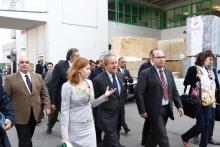Saudi Arabian cement demand is expected to increase 9.4%/year to over 80 million tonnes by 2017 as massive infrastructure projects create surging demand.
Virtually all regions of the country will post gains, with large new cement production capacities coming online in the next few years. These and other trends are presented in the 2013
The country’s Ninth Development Plan 2010–2014 includes provisions for massive governmental investments, driving the construction share of GDP to an estimated 5.9% by the end of 2014. But the report cautions that “a unique set of coinciding mega-forces have converged to create this benign scenario, which may not be sustainable (from Arab Spring-motivated investments, industrial policy, ownership arrangements and energy subsidies).”
In 2005, cement demand in the Kingdom of Saudi Arabia reached less than 25 million tonnes. Since then the market has expanded by double digits, closing 2012 at over 53 million tonnes in cement consumption.
The recently published “CW report sees cement industry embarking into a “golden era” with strong growth in cement consumption, subsidised energy prices, and limited foreign competition. By the end of 2017, cement demand is projected to be 30 million tonnes higher than today.
“Admittedly, our 2017 demand number is aggressive, but the government’s resolution to spend its way to social harmony in the Kingdom is proven and should not be underestimated. We expect more projects to be announced together with expansion of existing projects,” CW Group analysts predicted.
But the industry is not without its concerns: a surge in cement prices has prompted caps on cement prices and the Saudi Ministry of Commerce to reinstate an export ban for both cement and clinker.
As new cement manufacturing capacity comes on-line, the fight for additional subsidised energy supplies is also raging between cement companies and the national energy provider, ARAMCO. The fuel issue is likely to intensify, as by the end of 2012 all cement companies operating in the Kingdom had announced expansion plans.
More than 25 million tonnes in new cement capacity has been announced to be commissioned by the end of 2017 with the bulk of the production lines scheduled to come on stream in 2014 and 2015. Yamama Cement and Eastern Province Cement have to date announced the most ambitious projects, each planning to add 3.5 million tons/year.
From a regional perspective, the cement capacity break-down is not seen to shift the profile materially; the centre region will hold the leading position while strengthening its regional footprint by 0.5 percentage point in the next five years.
The CW Group analysts note that the implications stretch beyond the borders of the Kingdom.
“These production capacity raise a loud alarm bell for cement producers in neighboring markets if the export ban is lifted and energy subsidies continue. Saudi Arabia will be the contender in this region and be a very strong competitor for regional export markets if it develops the logistics, marketing and distribution capabilities,” they say.
The 48-page report is available for $2,975 from the CW Group (Email: %$Linker:






